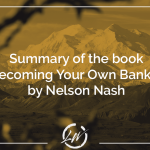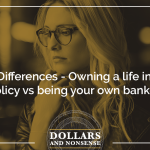Research has revealed that financial security is the leading source of happiness—and stress. Financial instability can affect your family, your future, your health, your children’s education, and even your relationship.
Becoming your own banker is one way to regain control over your finances and start building a healthy savings base. (The strategy is based on the book by Nelson Nash of the same name.)
Survey results indicate that more than half of Americans don’t trust banks. By becoming your own bank, you can step away from relying on a fragile banking system to safeguard your family’s financial security.
What’s more, you can also gain a number of tax and credit advantages.
If this sounds like your kind of solution, read on to learn the first step to becoming your own banker.
Step 1: Understanding Private Family Banking
The first step to becoming your own banker is to get to grips with the concept of family banking, also known as the infinite banking concept.
When people hear the term “become your own banker” they often picture literally starting a bank. Or, they think it involves hiding money in pillowcases under the floorboards.
Private family banking is neither of these.
What is Family Banking?
Family banking, or infinite banking, has existed for some time and was popularized by Nelson Nash. He used the concept to rescue himself from unsustainable debt and grow his finances to the point where he owned multiple “family banks”.
The way he did this was through whole life insurance policies.
Whole life policies used to be the norm in life insurance. As time progressed, term life insurance surpassed it in popularity. Term life insurance is much cheaper than whole life insurance. However, it lacks most of the benefits that whole life policies hold.
Instead of expiring, whole life policies are valid for the duration of your lifetime. After this, they pay out a tax-free death benefit. As well as a guaranteed death benefit, these policies also accrue what is termed a “cash value”.
The reason why whole life policies can be used as a “private bank” is that you can borrow against the cash value you have accrued.
Benefits of Private Family Banking
The main benefits associated with family banking are tax advantages, security, and “interest-free” cash flow. What’s more, the private family banking concept allows you to borrow money with none of the hurdles that come with credit applications.
Let’s take a closer look.
Tax Advantages
The first tax advantage to whole term policies is that they offer tax-deferred growth. Second, when the death benefit is paid out, this is tax-free.
“Interest-Free” Borrowing
While you’ll be charged interest on what you borrow from a whole life policy, this will often cancel out. When you apply for a loan against your cash value, the insurer does not draw on your policy. Instead, they loan you funds from an independent account that they own.
Therefore, while they are charging you interest on your loan, your cash value is untouched and continues to earn interest and dividends at a compounded rate.
Another advantage of borrowing against your cash value is there’s no approval process. The money is yours to borrow so long as you have sufficient cash value, and you can be in possession of it in a matter of days.
Lastly, any money you borrow is private, and won’t show on your credit report.
Enhanced Security
While retirement funds account for the lion’s share of most people’s financial security, these are not always the safest of vehicles for saving. The pandemic spurred market crash is bringing this to the forefront of people’s minds as they watch their 401K account balances dwindling.
While now is not the time to pull your 401K, and hopefully these accounts will recover in due course—it’s not nice having so little control or surety over your savings.
Contrastingly, savings that are in whole life insurance policies are more stable, providing you go with a mutual life insurance policy rather than a stock insurance policy.
Which brings us to the next step in becoming your own banker.
Step 2: Getting the Right Policy
Once you thoroughly understand the concept of family banking, you’ll be able to ascertain whether it is something that fits in with your financial goals. If it is, the next step to becoming your own banker is to investigate whole life insurance products.
There are many different types of whole life policies, and not all of them are suitable for private family banking purposes.
Look At Cash Value Accumulation
For a whole life policy to truly facilitate family banking, it needs to provide maximum cash value accumulation. Most policies are structured in the opposite direction, in the interest of enhancing the death benefit.
To be able to achieve a faster rate of compounded interest, and a cash value that you can borrow from, like a bank—you need a policy that’ll allow you to plow all your resources into the cash value. This is often termed to be a “blended” policy.
Take Advantage of Riders
To meet the criteria for effective cash flow banking, a policy also needs to allow “paid-up additions riders” and “term insurance riders”. These riders essentially allow you to increase the cash value of your policy as quickly as you can without triggering the IRS stipulated level where your policy will be deemed an investment for tax purposes (which means no tax deferment).
Go for Products That Offer Non-Direct Recognition Policy Loans
Another vital requirement is that the policy you select must be eligible for non-direct recognition policy loans. In normal language, this means that any loans you take against your cash value will not be taken from your policy. Your cash value will remain untouched and continue to earn interest and dividends, offsetting any interest you have to pay on the loan.
Direct recognition policy loans, on the other hand, will result in a withdrawal of funds from your cash value. This will impact your earning ability and negate one of the big benefits of private family banking.
Choosing a whole life insurance product for the purpose of family banking is a big decision. Don’t rush the process. Research different insurers, compare your options, and speak to professionals.
Are You Interested in Becoming Your Own Banker?
Becoming your own banker holds numerous advantages. From tax savings to compounded growth, savings security, and essentially interest-free loans, private banking can be a cornerstone of a successful long term financial growth plan.
However, to implement it effectively, you need to pick the right whole term insurance product.
If you feel that you need advice, contact us. We specialize in helping families find financial freedom through the private banking concept.
You can also take advantage of our free course, or tune in to our podcast for more insider info.






